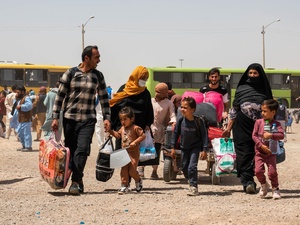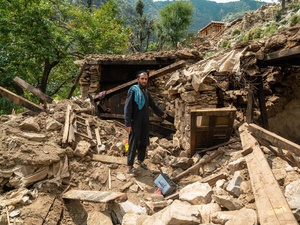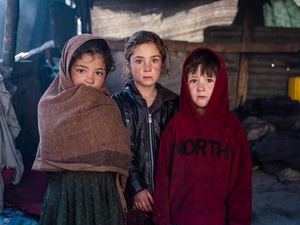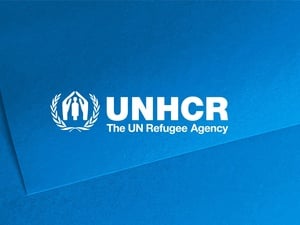Afghanistan emergency
Afghanistan emergency
Initial reports indicate there has so far been no large-scale population displacement in areas of northern Afghanistan taken by the Northern Alliance the past few days. This provides some hope that civilians will not take flight in these areas and that the UN and other humanitarian organizations will be able to provide them with assistance sur place as soon as possible. We urge military forces to exercise restraint and show respect for civilians, especially as they start moving into other ethnic areas. We do not want to see a new Afghan exodus.
UNHCR is extremely worried about the situation of more than 6,000 displaced Afghans in Makaki camp on the edge of the Afghan border with Iran. According to the latest reports from border monitors at Milak, Iran's south-eastern border crossing, the internally displaced people (IDPs) in the camp now appear to be caught in between armed Taliban forces still in the site and the opposition Northern Alliance pushing to take control of the area. Border monitors were told that there seemed to be some negotiations going on between the two sides in the camp, which is just a few kilometres inside Afghanistan. This morning, UNHCR staff in the Iranian border town of Zabol rushed to Milak to investigate the reports of overnight fighting in the Afghanistan border town of Zaranj and the nearby village of Makaki, where the camp is located. The reports, still unconfirmed, say Zaranj and the areas immediately south of the town, which include Makaki camp, were taken overnight by Northern Alliance forces. According to eyewitness accounts, there was a short fight between advancing Northern Alliance forces and Taliban troops who have controlled much of Nimruz province, in the south-west of the country. No reports of casualties have so far been received. Staff in the nearest hospital in Zabol, inside Iran, say they have also not received any casualties.
This morning, the Iranian Red Crescent Society sent in four ambulances to Makaki, a camp they set up more than a month ago and continue to run together with MSF. Aid workers have, however, been withdrawn from the camp, which has been known to have significant weaponry and a number of armed Taliban men.
There have been no reports of incidents at Mile-46, another camp farther south of Zaranj, with nearly 1,000 Afghans. Mile-46 is in an area which was already under the control of the Northern Alliance.
In Khorasan Province, to the north-east, border monitors who visited the main crossing at Dogharoun, this morning, have been told of the presence of opposition forces in the Afghanistan town of Islam Qala, directly opposite from Dogharoun and on the road to Herat. Taliban authorities are said to have left the border town without a fight yesterday afternoon, a few hours after the fall of Herat to Northern Alliance troops was reported. A flag formerly used by the Taliban was, however, still flying this morning at the edge of the "zero point". Just below it, opposition forces had hoisted a new flag. Commercial trucks heading for Herat, were lined up at the border waiting for customs clearance from new border officials from the Alliance.
The flow of Afghan returnees from Iran seemed normal this morning. Yesterday (Monday), 876 Afghans, visibly happy to receive news of the fall of Herat, returned to Afghanistan through the border at Dogharoun.
UNHCR, meanwhile, was still awaiting the green light from Iranian government authorities to allow a second humanitarian convoy, organised jointly with the Iranian Red Crescent Society, to be sent from Mashad, in north-eastern Iran, to Herat. The convoy, still expected to depart this week, will take 2,000 plastic sheets and 10,000 blankets to Herat from UNHCR's stockpiles in Mashad. UNHCR is also awaiting UN approval of a possible return of staff to parts of Afghanistan. UN security staff in the coming days will make a security assessment of the road from Mashad to Herat that is expected to be used for cross-border operations from Mashad.
Should the situation in western Afghanistan remain stable, UNHCR is likely to see an increase in spontaneous returns from Iran, which currently hosts more than 2.3 million Afghan refugees, according to government figures.
UNHCR is also continuing the pre-positioning of humanitarian supplies in Termez, Uzbekistan, for expected transfer into Northern Afghanistan as soon as the security situation allows. We began an airlift from Peshawar to Termez on Sunday and a second flight, carrying 670 tents, is scheduled for today. More flights are planned tomorrow and in the coming days. We are also trucking supplies from other Central Asian republics.
We are also looking at ways of helping those refugees who may want to go back to Afghanistan from Pakistan in the wake of the latest developments. UNHCR international staff, who had pulled out of Afghanistan nearly two months ago, are now ready to return as soon as the UN security specialists give us a green light to go back.
In southern Pakistan, meanwhile, Pakistan Frontier Corps troops at the Chaman border south-east of the Afghan city of Kandahar on Tuesday interrupted UNHCR's transfer of Afghan refugees from the Killi Faizo transit site.
Baluchistan's provincial authorities have reportedly insisted that all Killi Faizo's more than 3,000 Afghans be relocated in one group to the newly established Roghani camp, some 16 kilometres away. Roghani lacks sufficient latrines for such a large group to be transferred overnight.
During the first two days of the relocation operation of Afghans from Killi Faizo to Roghani, more than 640 recently arrived Afghan refugees were shifted to the Roghani camp, where UNHCR and its main partners Concern, Oxfam, MSF and Islamic Relief have been erecting tents and establishing services.
There are currently more than 718 tents erected at the Killi Faizo transit site, of which 36 are empty following the relocation of the desperate Afghan arrivals to Roghani. UNHCR wants to empty Killi Faizo, located only a stone's throw from the main Afghan border crossing, deeper inland to Roghani. We would like to leave only several dozen tents at the transit site to shelter desperate Afghans seeking safety in Pakistan before they can be shifted to Roghani.
On Monday night, the Frontier Corps refused to let UNHCR pre-register or even temporarily shelter some 70 families (some 300 persons) who had recently entered Pakistan. While the troops permitted one malnourished child into Killi Faizo's MSF-administered health centre for daytime treatment, he had to leave the compound at nightfall. UNHCR tried to persuade the Frontier Corps to let the child's family shelter in a tent outside the camp overnight, but the troops refused to let us send a tent to the other side of the fenced encampment. One woman who gave birth early Tuesday morning just outside Killi Faizo's fence was allowed by Frontier Corps troops into a tent on the Killi Faizo site.
The local Frontier Corps' commander at Chaman has said that no new arrivals will be allowed into Killi Faizo for pre-registration. The Home Secretary of Baluchistan Province told UNHCR staff on Monday that the Roghani camp should shelter Afghan refugees living in Quetta and other urban areas - people the government refers to as "externally displaced persons." He added, although that the transfer of desperate Afghans from Killi Faizo should continue.
UNHCR staff are working to clarify the conflicting statements by the government and military officials. Meanwhile, the tired and desperate Afghans in Killi Faizo await their transfer from the exposed border camp.









